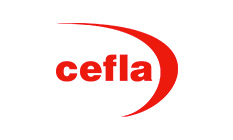Gias
energy: renewable sources
The context
GIAS S.p.A. is one of the top industrial food product facilities in Italy and also enjoys successful product positioning on foreign markets. The company has a technologically advanced Research and Development department; its industrial invention of frozen tomato, tested at Survel (Vegetables & Bean Freezing centre), is covered by an international patent. GIAS is a leader in the direct production of a complete range of vegetables and controls the entire production chain – from sowing to harvesting, ensuring improved produce health and crop quality thanks to immediate processing.
Type of intervention
Cefl a has designed, supplied and installed a trigeneration plant with a Jenbacher 2 MWe reciprocating IC engine, fuelled by natural gas, with a -40°C ammonia absorptiontype cooling unit, at the GIAS SpA factory located in Mongrassano Station (CS). The plant includes:
- the genset unit,
- the exhaust fume recovery superheated water generator,
- the engine cooling heat recovery circuit,
- the ammonia absorption-type unit for the production of refrigerating energy to feed to the cooling system at -40°C.
In addition to the cogeneration package and trigeneration system, Cefla also provided all the mechanical (heating and cooling energy distribution systems) and electrical systems needed for effective interfacing with existing production systems, thus ensuring the customer can count on a carefully engineered ‘turnkey’ plant set-up.
The superheated water is circulated to an ammonia absorption cooling system with a capacity of approximately 242kWf, complete with evaporative towers for fluid condensation and connection to the existing plant.
The philosophy behind the design is typical of industrial production plants that aim to ensure:
- straightforward plant engineering,
- component reliability,
- safe use,
- easy maintenance and user-friendly routine system operation.
Plant Solutions
GIAS needs, on average, more than 2MW of electrical energy to power production lines and low temperature storage cells. The feasibility study showed how selfproduction of electrical energy, combined with thermal recovery in the form of REFRIGERATING ENERGY at -20°C, is the best solution.
Lastly, hot water recovery for the purposes of boiling vegetables is a useful way of optimising and maximising energy and economic savings. The customer’s greatest advantage lies in CEFLA’s ability to act as a General Contractor: Cefla has supplied all the works, including after-sales services – except for some more accessory ones – and this o ffers the best possible guarantee of the essential performance needed to undertake such a major investment and e ffect maintenance during running of the plant.
TECHNICAL DATA
Electrical Power: 2.004 kW
Recovered hot water heat power: 1.050 kWt
Refrigerating power: 242 kW (ammoniaca a -40°C)












